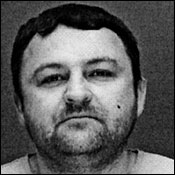31.8.05
30.8.05
ATM cards pirated for plenty, police say - Ploy used cameras, magnetic strip reader
 Perpetrator Ioan Emil Codarcea
Perpetrator Ioan Emil Codarcea
29.8.05
Evolution of Incident Response by Kevin Mandia (from Dan)
AICPA Incident Response Plan Template from Troy
Incident Response Teams Need to Change - Dr. Eugene Schultz
md5deep is a set of tools for recursive hash functions from Jesse Kornblum of AFOSI
28.8.05
Legal disassembly - "When security researcher and ISS employee Michael Lynn went to give a presentation at the Black Hat conference in Las Vegas, little did he know he would ignite a legal firestorm questioning whether even the act of looking for security vulnerabilities violates the law."
22.8.05
16.8.05
CMU Software Engineering Institute - Handbook for Computer Security Incident Response Teams (CSIRTs)
15.8.05
14.8.05
13.8.05
"Besides the danger of a direct mixture of religion and civil government, there is an evil which ought to be guarded against in the indefinite accumulation of property from the capacity of holding it in perpetuity by ecclesiastical corporations. The establishment of the chaplainship in Congress is a palpable violation of equal rights as well as of Constitutional principles. The danger of silent accumulations and encroachments by ecclesiastical bodies has not sufficiently engaged attention in the U.S." — James Madison - Outvoted in the bill to establish the office of Congressional Chaplain
10.8.05
Thomas Jefferson, Letter To Isaac McPherson Monticello, August 13, 1813
"If nature has made any one thing less susceptible than all others of exclusive property, it is the action of the thinking power called an idea, which an individual may exclusively possess as long as he keeps it to himself; but the moment it is divulged, it forces itself into the possession of everyone, and the receiver cannot dispossess himself of it. Its peculiar character, too, is that no one possesses the less, because every other possesses the whole of it. He who receives an idea from me, receives instruction himself without lessening mine; as he who lights his taper at mine, receives light without darkening me.
That ideas should freely spread from one to another over the globe, for the moral and mutual instruction of man, and improvement of his condition, seems to have been peculiarly and benevolently designed by nature, when she made them, like fire, expansible over all space, without lessening their density at any point, and like the air in which we breathe, move, and have our physical being, incapable of confinement or exclusive appropriation.
Inventions then cannot, in nature, be a subject of property."
Free Books on Creative Freedom
Free Culture: How Big Media Uses Technology and the Law to Lock Down Culture and Control Creativity. "Lawrence Lessig could be called a cultural environmentalist. One of America’s most original and influential public intellectuals, his focus is the social dimension of creativity: how creative work builds on the past and how society encourages or inhibits that building with laws and technologies. In his two previous books, CODE and THE FUTURE OF IDEAS, Lessig concentrated on the destruction of much of the original promise of the Internet. Now, in FREE CULTURE, he widens his focus to consider the diminishment of the larger public domain of ideas. In this powerful wake-up call he shows how short-sighted interests blind to the long-term damage they’re inflicting are poisoning the ecosystem that fosters innovation."
Author Kembrew McLeod Trademarked the Phrase "Freedom of Expression" to illustrate how excessive application of intellectual property rights has resulted in the theft of human culture. His book Freedom of Expression®: Overzealous Copyright Bozos and Other Enemies of Creativity explores the ramifications of allowing culture to be increasingly fenced off and made proprietary.

More great Quotes on Intellectual Property Issues
8.8.05
FCC Issues Ruling on Internet Services and CALEA - Software-based Internet services may have to be structured in a way that facilitates interception.
A Joint Reply on the Public Interest was Submitted by the CDT, EFF and Other Groups
